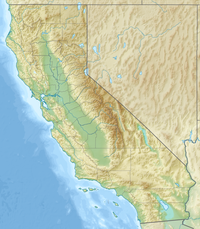This article needs additional citations for verification. (December 2017) |
| Altamont Free Concert | |
|---|---|
 Mick Jagger stops performing to address Hells Angels | |
| Genre | Rock and folk, including blues-rock, folk rock, jazz fusion, latin rock, country rock, and psychedelic rock styles. |
| Dates | December 6, 1969 |
| Location(s) | Altamont Speedway, Tracy, California, U.S. |
| Founders | Jorma Kaukonen, Spencer Dryden, Grateful Dead[1] |
| Attendance | 300,000 (estimated)[2] |
The Altamont Speedway Free Festival was a counterculture rock concert in the United States, held on Saturday, December 6, 1969, at the Altamont Speedway outside of Tracy, California.[2][3][4][5] Approximately 300,000 attended the concert,[2][4][5] with some anticipating that it would be a "Woodstock West".[6] The Woodstock festival had taken place in Bethel, New York, in mid-August, almost four months earlier.
The event is remembered for its use of Hells Angels as security and its significant violence, including the killing of Meredith Hunter and three accidental deaths: two from a hit-and-run car accident, and one from a drowning incident in an irrigation canal.[4][5] Scores were injured, numerous cars were stolen (and subsequently abandoned), and there was extensive property damage.[7][8]
The concert featured performances (in order of appearance) by Santana, Jefferson Airplane, the Flying Burrito Brothers, and Crosby, Stills, Nash & Young (CSNY), with the Rolling Stones taking the stage as the final act.[9] The Grateful Dead were also scheduled to perform after CSNY, but shortly before their scheduled appearance, they chose not to due to the increasing violence at the venue.[10] "That's the way things went at Altamont—so badly that the Grateful Dead, the prime organizers and movers of the festival, didn't even get to play," wrote staff at Rolling Stone magazine in a detailed narrative on the event,[11] terming it, in an additional follow-up piece, "rock and roll's all-time worst day, December 6th, a day when everything went perfectly wrong."[12]
Filmmakers Albert and David Maysles shot footage of the event and incorporated it into the 1970 documentary film titled Gimme Shelter.[13]
- ^ Barbara Rowes. Grace Slick, a Biography. p. 155.
- ^ a b c "300,000 jam musical bash". Chicago Tribune. December 7, 1969. p. 1, sec. 1.
- ^ "Rockfest jams freeway traffic". Spokesman-Review. (Spokane, Washington). Associated Press. December 7, 1969. p. 2.
- ^ a b c "Biggest rock concert ends". The Bulletin. (Bend, Oregon). UPI. December 8, 1969. p. 7.
- ^ a b c Craig, Pat (December 8, 1969). "Out of sight, man! 300,000 at bash". Lodi News-Sentinel. (California). SJNS. p. 1.
- ^ "Altamont Rock Festival: '60s Abruptly End" (PDF). Livermore Heritage Guild Journal. March–April 2010. Archived from the original (PDF) on December 26, 2011.
- ^ Ortega, Tony (August 24, 2010). "Viewing the Remains of a Mean Saturday Village Voice December 18, 1969". Village Voice. Archived from the original on July 1, 2012. Retrieved October 25, 2010.
- ^ "Altamont Rock Festival of 1969: The Aftermath" (PDF). Livermore Heritage Guild Journal. January–February 2011. Archived from the original (PDF) on December 26, 2011.
- ^ Bangs, Lester; Brown, Reny; Burks, John; Egan, Sammy; Goodwin, Michael; Link, Geoffrey; Marcus, Greil; Morthland, John; Schoenfeld, Eugene; Thomas, Patrick; Winner, Langdon (January 21, 1970). "The Rolling Stones Disaster at Altamont: Let It Bleed". Rolling Stone. Archived from the original on June 15, 2018. Retrieved January 8, 2015.
- ^ Lydon, Michael (September 1970). "An Evening with the Grateful Dead". Rolling Stone.
- ^ "The Rolling Stones Disaster at Altamont: Let It Bleed". Rolling Stone. January 21, 1970. Retrieved May 4, 2019.
- ^ Burks, John (February 7, 1970). "Rock & Roll's Worst Day". Rolling Stone. Archived from the original on March 14, 2008. Retrieved May 24, 2013.
- ^ Colin Larkin, ed. (1997). The Virgin Encyclopedia of Popular Music (Concise ed.). Virgin Books. p. 35. ISBN 1-85227-745-9.
